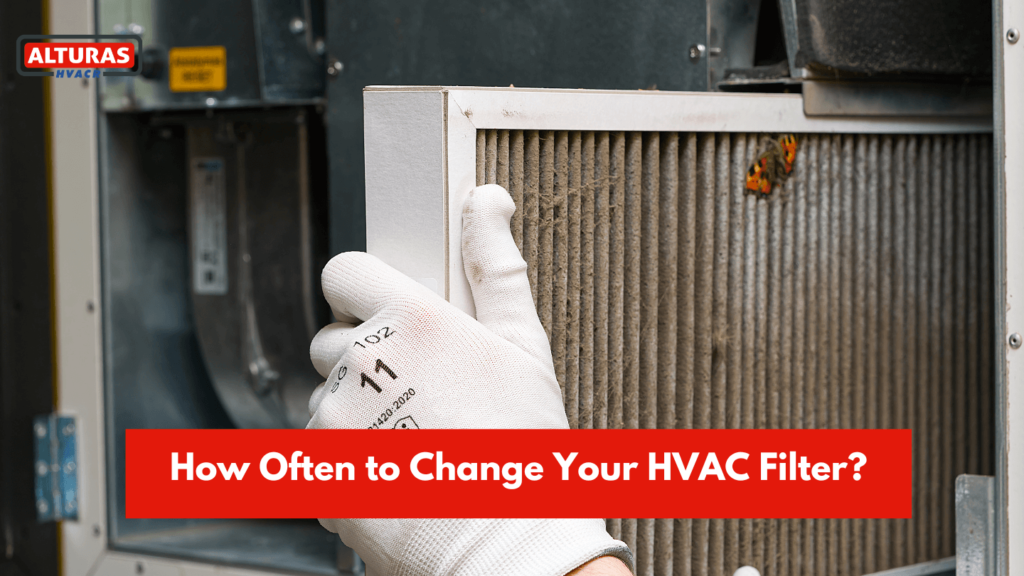The heart of your home’s comfort system is undoubtedly your HVAC (Heating, Ventilation, and Air Maintaining your HVAC system is crucial for ensuring its longevity and efficiency. One of the simplest yet most vital maintenance tasks is changing the air filter. But how often should you do it? This comprehensive guide will cover everything you need to know about how often to change HVAC filter, from the factors that influence the frequency to specific scenarios like having pets or living in an apartment. By the end of this guide, you’ll have a clear understanding of the best practices to keep your HVAC system running smoothly.
Helpful For You: How to Select Right HVAC Air Filter
The Importance of a Clean HVAC Filter
A clean HVAC filter is more than just a maintenance task; it’s a cornerstone of healthy indoor living. As air circulates through your home, it carries with it a myriad of contaminants, including dust, pollen, pet dander, and other allergens. Your HVAC filter acts as a barrier, trapping these particles and preventing them from circulating throughout your living space.
A clogged filter, on the other hand, is a breeding ground for bacteria and mold. It restricts airflow, forcing your HVAC system to work harder, which can lead to premature wear and tear and higher energy consumption. Moreover, a dirty filter compromises indoor air quality, potentially triggering allergies and respiratory issues for you and your family.
Must Read: What is Mold?
How Often to Change Your HVAC Filter?
The frequency of changing your HVAC filter depends on various factors, including the type of filter, the environment, and the specific needs of your household. Generally, it’s recommended to change your filter every 30 to 90 days. However, certain situations may require more frequent changes. Regular monitoring and being aware of your specific circumstances can help in making informed decisions regarding filter replacement.
What Happens If I Forget to Replace My Air Filter?
Forgetting to replace your air filter can lead to several problems. A dirty filter restricts airflow, forcing your HVAC system to work harder, which can result in higher energy bills and potential system breakdowns. Moreover, a clogged filter can compromise indoor air quality, leading to health issues like allergies and respiratory problems. Keeping a schedule or setting reminders can help avoid these costly and inconvenient issues.
Factors That Affect How Often to Change Your Air Filter
1. Type of Filter
Different filters have varying lifespans. For instance, fiberglass filters need to be replaced more frequently than pleated filters, which can last up to six months. Knowing the type of filter you use can significantly impact how often you need to check and replace it, ensuring optimal performance.
2. Home Environment
Homes with pets, smokers, or residents with allergies or respiratory conditions require more frequent filter changes to maintain optimal air quality. Each of these factors contributes additional particles to the air, which can quickly clog the filter and reduce its effectiveness.
3. Seasonal Changes
During peak seasons, like summer and winter, when the HVAC system is used more intensively, filters may need to be changed more often. Increased usage during these times means more dust and particles will be trapped, necessitating more frequent maintenance.
Reasons You Should Change Your HVAC Filter Regularly
Changing your HVAC filter regularly offers several benefits:
- Improved Air Quality: Clean filters trap dust, pollen, and other pollutants, improving indoor air quality and creating a healthier living environment.
- Energy Efficiency: A clean filter allows for better airflow, reducing the strain on your HVAC system and lowering energy consumption, which can lead to significant cost savings.
- System Longevity: Regular filter changes prevent the buildup of debris, which can cause wear and tear on your HVAC system, extending its lifespan.
- Health Benefits: Removing allergens and pollutants from the air can reduce the risk of allergies and respiratory issues, promoting better overall health for household members.
Also Read: Health Dangers That AC Refrigerant Leaks Can Cause
How often to change HVAC filter in winter?
In winter, your HVAC system works harder to keep your home warm. It’s advisable to check your filter every month and replace it as needed. The increased usage during cold months can lead to quicker filter clogging, so more frequent inspections are beneficial.
How Often to Change Air Filter with Pets?
If you have pets, it’s best to change your HVAC filter every 20 to 45 days. Pet hair and dander can quickly clog filters, reducing their effectiveness and indoor air quality. Regular replacement ensures your system runs efficiently and your home’s air remains clean and healthy for all residents.
How Often to Change Air Filter in Apartment?
Living in an apartment might mean smaller spaces and potentially more concentrated pollutants. Aim to change your air filter every 30 days to maintain good air quality and system efficiency. This frequency helps in managing dust, dander, and other particles that accumulate faster in confined spaces.
How Often to Change Air Filter in Air Purifier?
Air purifiers often come with different types of filters, like HEPA filters, which typically need to be replaced every 6 to 12 months. Check the manufacturer’s recommendations for specific guidelines to ensure your air purifier operates at peak efficiency, providing the best air quality.
When to Call Professionals
While changing your HVAC filter is a DIY task, there may be instances when a professional HVAC company’s help is necessary:
- Difficulty accessing the filter: Some HVAC systems have filters located in hard-to-reach areas.
- Suspected HVAC issues: If you notice unusual noises, reduced airflow, or increased energy consumption, it’s time to call a professional to inspect your system.
- Filter replacement recommendations: HVAC technicians can advise on the appropriate filter type and replacement frequency based on your specific needs.
FAQs
Can I Run My HVAC System Without Using a Filter?
Absolutely not. Running your HVAC system without a filter is a recipe for disaster. The filter is essential for capturing dust, pollen, and other contaminants. Operating your system without one can lead to severe damage to the internal components, decreased efficiency, and compromised indoor air quality.
How Long Can I Truly Go Before Changing My HVAC Filter?
While it’s tempting to push the limits, delaying filter replacement can have negative consequences. As a general rule, avoid going more than three months without changing your filter, even if it appears clean. Factors like indoor air quality, pet ownership, and system usage can shorten this timeframe.
How often should I replace my HVAC filter?
The frequency of HVAC filter replacement depends on several factors, including filter type, indoor air quality, and system usage. As a starting point, aim to replace your filter every 1-3 months. However, it’s essential to inspect your filter regularly and replace it when it becomes visibly dirty or clogged.
How do I know when my HVAC air filter needs to be replaced?
There are several signs that indicate it’s time to change your HVAC air filter:
- Restricted airflow: If you notice a decrease in airflow from your vents, a clogged filter might be the culprit.
- Increased energy bills: A dirty filter can reduce your HVAC system’s efficiency, leading to higher energy consumption.
- Dust buildup: If you see excessive dust buildup in your home, despite regular cleaning, it could be due to a failing filter.
- Visible dirt or debris: Inspecting the filter for visible dirt, dust, or pet hair is a straightforward way to determine if it needs replacement.
What happens if you don’t change the HVAC filter?
Neglecting to change your HVAC filter can lead to a host of problems, including:
- Reduced airflow: A clogged filter restricts airflow, making your HVAC system work harder.
- Increased energy consumption: Reduced airflow leads to higher energy bills.
- System breakdowns: Overworking your HVAC system can cause premature wear and tear, leading to costly repairs.
- Poor indoor air quality: A dirty filter allows allergens, dust, and other contaminants to circulate in your home.
How long do 4-inch HVAC filters last?
The lifespan of four HVAC filters depends on several factors, including filter type, indoor air quality, and system usage. If you change your filter every three months, four filters would last for a year. However, you might need to replace them more frequently based on your specific circumstances.

